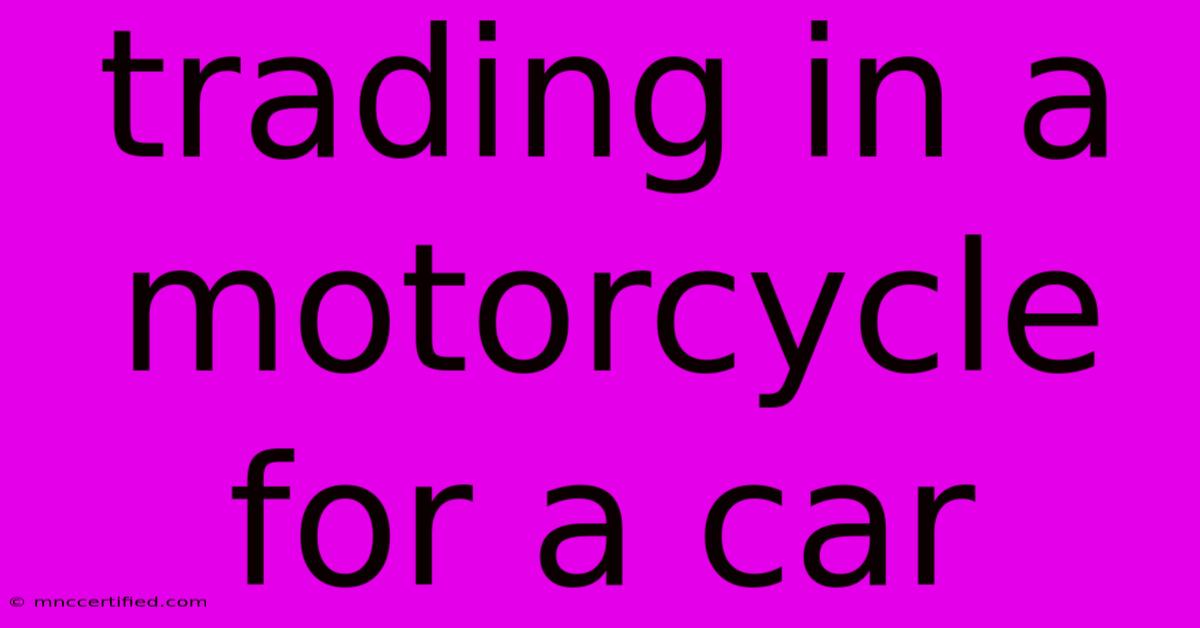Trading In A Motorcycle For A Car

Table of Contents
Trading Your Motorcycle for a Car: A Comprehensive Guide
Trading in your motorcycle for a car can be a significant life change, driven by evolving needs or simply a desire for something different. This guide will walk you through the entire process, from assessing your situation to finalizing the deal, ensuring you get the best possible value for your bike.
Why Trade Your Motorcycle?
Before diving into the mechanics of the trade, let's explore the common reasons people swap two wheels for four:
- Increased Comfort and Space: Motorcycles, while exhilarating, lack the comfort and cargo space of a car. This is especially true for longer journeys or when transporting passengers or goods.
- Improved Safety: Cars offer significantly better protection in accidents compared to motorcycles. This is a major consideration for many riders, especially those with families.
- Changing Lifestyle: Life changes, such as starting a family, changing jobs (requiring commuting in varied weather), or simply a shift in priorities, can make a car a more practical choice.
- Weather Considerations: Riding a motorcycle in inclement weather can be challenging and uncomfortable. A car offers protection from the elements.
Preparing Your Motorcycle for Trade-In
To maximize your trade-in value, meticulous preparation is key. This involves:
- Cleaning: A thoroughly cleaned motorcycle will present much better to potential buyers or dealerships. Wash, wax, and detail it to remove any dirt, grime, or scratches.
- Repairs: Address any minor mechanical issues or cosmetic damage. Fixing these problems beforehand will significantly impact your trade-in offer.
- Documentation: Gather all necessary documents, including the title, proof of ownership, and service records. A well-maintained service history demonstrates responsible ownership.
- Assessing Your Motorcycle's Value: Research the current market value of your motorcycle using online resources like Kelley Blue Book (KBB) or Edmunds. Understand its worth to negotiate effectively.
Finding the Right Dealership
Choosing the right dealership is crucial for a smooth trade-in process. Consider these factors:
- Reputation: Opt for dealerships with a strong reputation for fair pricing and customer service. Read online reviews to gauge their trustworthiness.
- Car Selection: Ensure the dealership offers a range of cars that meet your needs and budget.
- Trade-In Policy: Inquire about their trade-in policy, including their appraisal process and any potential fees. Some dealerships offer better trade-in values than others.
- Negotiation: Be prepared to negotiate the price of both the car and the trade-in value of your motorcycle.
The Trade-In Process: Step-by-Step
- Appraisal: The dealership will appraise your motorcycle, considering its make, model, year, condition, and mileage. Have your research ready to support your valuation.
- Negotiation: Negotiate the trade-in value and the price of the car. Remember, the trade-in value is often lower than the private sale value, so be prepared for this.
- Paperwork: Complete all the necessary paperwork, including the trade-in agreement and the financing documents (if applicable). Carefully review everything before signing.
- Transfer of Ownership: The dealership will handle the transfer of ownership of your motorcycle.
Maximizing Your Trade-In Value: Pro-Tips
- Private Sale vs. Trade-In: Consider selling your motorcycle privately. You'll likely get a higher price, but it requires more effort and time.
- Timing: Trade-in values can fluctuate. Timing your trade-in strategically could increase your return.
- Condition is Key: The better the condition of your motorcycle, the higher the trade-in value.
- Negotiate Aggressively (but Respectfully): Don't be afraid to negotiate. Be firm but polite.
Conclusion: Riding into the Future
Trading your motorcycle for a car is a significant decision. By following this comprehensive guide and preparing thoroughly, you can navigate the process smoothly and confidently, securing a fair deal and ensuring a seamless transition to your new vehicle. Remember, research is your best friend throughout the entire process. Good luck!

Thank you for visiting our website wich cover about Trading In A Motorcycle For A Car. We hope the information provided has been useful to you. Feel free to contact us if you have any questions or need further assistance. See you next time and dont miss to bookmark.
Featured Posts
-
Kendrick Lamars Gnx Album A Surprise Drop
Nov 23, 2024
-
Does Insurance Report To Carfax
Nov 23, 2024
-
Insurance For The Mining Industry
Nov 23, 2024
-
Senate Recount Off Caseys Concession
Nov 23, 2024
-
Boson Protocol Price Prediction
Nov 23, 2024